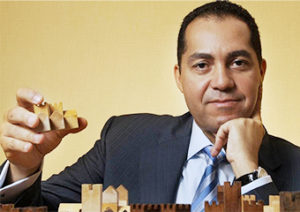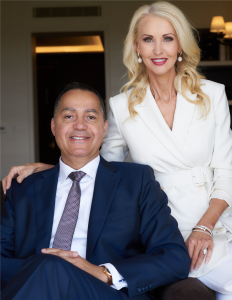
Don Peebles speaks with Dottie Herman about his start in the industry, working hard, loving what he does and his new fund to bring diversity to real estate and provide access to capital for women and minorities.

Don Peebles speaks with Dottie Herman about his start in the industry, working hard, loving what he does and his new fund to bring diversity to real estate and provide access to capital for women and minorities.

Artist's rendering of the lush courtyard The Bath Club
The Bath Club Miami Beach was founded in 1926 as a members-only gathering place where wealthy scions, celebrities and other influentials could meet over lunch, swimming and tennis. Chartered by the State of Florida, it was the first private social club in the Southeast, developed on the site of a one-time avocado plantation.
Apropos of societal and cultural changes that took place over subsequent decades, Roy Donahue (Don) Peebles became the club’s first African American member in 1996. A few years later, the visionary developer purchased the property and then added a 107-unit luxury condo tower and six elegant villas on the site.
It’s likely that none of the founders could have imagined that Peebles would one day own that property and transform it into an “exclusively inclusive” club that welcomed members of all ethnicities, cultures and lifestyles.
But meet Don Peebles, an entrepreneur with a strong social conscience and extraordinary commitment to diversity. Peebles is the founder and chairman of The Peebles Corporation, a multibillion-dollar venture that is the largest black-owned real estate development company in the U.S.—with projects in New York, Boston, Philadelphia, Washington D.C., Charlotte, San Francisco, and Los Angeles, as well as the one at The Bath Club in Miami.
He is also an author, popular keynote speaker, and regular guest on CNN, CNBC and FOX, addressing educational, business and professional issues. He has served on the National Finance Committee of President Barack Obama, on the Board of the Greater Miami Convention and Visitors Bureau and is the former Chairman of the Congressional Black Caucus Foundation.
Forbes.com spoke to Mr. Peebles about his plans to transform the historic Bath Club to a modern private club and open up its membership:
As a real estate entrepreneur, how, when and why did you get involved with the property?Don Peebles: I responded to an international Request for Proposal (RFP) and was ultimately the chosen responder within the competition. They liked my vision for the Club. The opportunity to develop directly on the ocean in this most coveted part of Miami Beach is enough for any developer to be interested but to be able to create some balance where it was once denied was incredibly motivating.
Given the Club’s discriminatory history, it was a chance to make a statement as to how far Miami and America had come. My commitment to the preservation of the clubhouse, keeping it as a venue and allowing original members access, was just one more reason I was chosen.
As the first African American member of the Club, what did the purchase mean to you personally?
DP: You know, I didn’t even know that I was the first African American member until I received a phone call from the Miami Herald after I had joined. To be a part of the history of an institution like this and being afforded the opportunity to be the catalyst for transforming it was motivating.
Since the beginning of my career, every project I have ever pursued was fueled by a passion for positive change—creating inclusion, which will give rise to a balance. My company engages in “affirmative development™” and this is the main vehicle through which we mandate ourselves to engage a minimum of 30% contracting on all our projects with Minority and Women-Owned Businesses.
This is not only socially effective but financially effective, as well…we call it “doing well by doing good.” In today’s world, people are demanding corporations do more than just make money. Businesses with an eye to the future would do well to begin to elevate their goals of inclusion and diversity. As a 100% minority-owned company, my wife and I have personally committed to relaunching The Bath Club. When we sat down and talked about how to reimagine this Club, while keeping its historical roots and bringing it into the 21st century, we knew these principles would be our guide.
Exactly where is The Club located?
DP: The Club is beachfront on the Atlantic Ocean on Collins Avenue in a historic district of Miami Beach. Its location is ideal for locals, travelers and annual visitors looking to explore the luxe and more refined Miami lifestyle, to enjoy stellar oceanside service, and to escape from the cold weather.
What are your goals for its reinvention?
DP: To bring our “affirmative development™” vision to life, we brought on the very talented female, minority-owned firm Antrobus + Ramirez, for the redesign. Luxury is increasingly aligned with legacy, history and authenticity–things that never go out of style and are appreciated more as time goes by. Our goal is to keep a sense of history embedded in the property while modernizing it to fit in today’s world.
What type of traveler would the new Bath Club appeal to? How do you anticipate members will use the club?
DP: The Bath Club is a members-only club that seeks to foster the idea of “Exclusively Inclusive.” Membership isn’t based on wealth or status. The Club will appeal to individuals who want a place that feels like home on Miami Beach. We will be accepting only 200 memberships for this coveted experience.
Sophisticated travelers looking to experience the best of what Miami life has to offer will find themselves right at home. We have created a historic space akin to an estate on the ocean. With a relaxed and inviting atmosphere in mind, we have provided many common areas within the property for 200 members and their guests to mingle, relax and host events.
We intend for this to be a “home away from home,” a place that our members can enjoy all day and well into the evening feeling at home. Family events will include: sports lessons, Sunday barbecues, outdoor movies and guest lectures with the club offering places to dine, relax, read, sun, work and play—with all the services to make these choices effortless. Ultimately, it will be a place for Miami’s residents, but also welcoming to celebrities and affluent travelers who want high-quality service.
What competition does the Club have in southern Florida?
DP: In terms of a private club, the Bath Club is peerless. Vizcaya Museum and Gardens (formerly called Villa Vizcaya) is a competitive and authentic event venue, but it is not a private club nor is it located on a huge beachfront. Some newer hotel-affiliated beach clubs do exist but they’re also a totally different experience; they’re not the same at all. A historic and authentic private beach club capped at only 200 memberships is an entirely unparalleled experience.
Can you describe the Club in terms of its amenities, ground, services, etc.?
DP: Members and their guests can enjoy exclusive access to our beach and pool with complimentary chaise lounges, umbrellas, towels and daily cabana rental. We have spa services as well as a fitness center and two clay tennis courts plus curated wellness programs which include yoga, meditation, cooking classes and more. We offer perks for the whole family including kids’ programs with babysitting, special event discounts, access to private members-only events, full-day programming and much more!
What type of cuisine/dining experience is planned?
We’re in the midst of putting the finishing touches on the dining experience at The Bath Club. The menu for our Poolside Restaurant & Bar will be curated by Apicii Hospitality.
When is the launch planned and how can people learn more?
Our official launch is fast-approaching and set to take place in early 2020. Potential members can request more information by emailing: membership@thebathclub.com/
Developer Don Peebles remembered launching sales for beachside condos he built after the turn of the century. Marketing Miami Beach meant "sex appeal and sizzle," he recalled in a phone call with Bisnow last week. "That meant objectifying women."
Consciously, he sought to counter the status quo by promoting a family-oriented vibe and hiring an all-women sales team.
These days, Peebles is relaunching the Bath Club, a Miami Beach institution that dates to 1927, as a private country club. Peebles said it will be a "more mature Soho House," and likewise targeted to families.
Peebles is struck by how lopsided the real estate industry is, even in 2019. Nearly all of his development deals are made with white males, he said. Is he a feminist?
"Yes!" Peebles said. "Men can and should be.
"Women are 65% of the real estate agents in the country," he continued. "However, they make up less than 5% of the people who are running the business. It's astonishing. In commercial real estate, you have to look hard to find any kind of gender diversity. That follows capital, to a large degree. You have $69 trillion of capital in hedge funds and private equity in real estate globally. Of that, 1.3% is invested in firms managed by women or people of color. In this country alone, women get less than 1 percent of private equity dollars invested in real estate. Minorities get less than half a percent."
The Peebles Corp. is a partner in $4.5B worth of projects around the country: a project in Manhattan's Tribeca neighborhood under construction, and in design/permitting/entitlement phases, a condo in Boston, two towers in downtown LA and an "urban village" in Charlotte, North Carolina. Peebles' company tagline is "affirmative development." The company ensures that at least 35% of its contractors, from lawyers to planners to architects, are women or minorities, Peebles said.
"The [International Council of Shopping Centers] conference in Las Vegas — women in the brokerage business won't go, or they're all uncomfortable," Peebles said. "All the social activities are women dancing on tables, or they go to a strip club."
At a recent real estate conference in Miami, Peebles said, "One of the exhibitors had 12 women in bikinis and high heels walking around the exhibit hall marketing their product. To professionals!"
Peebles said he is also raising a $500M private equity fund for urban infill, affordable housing projects in eight markets. He hopes to deploy that by the end of next year, ensuring funds largely benefit women and minority entrepreneurs.
Peebles sees the problem as systemic: At the institutions that invest from public pension or retirement funds — even though many of the workers contributing to those very funds are largely women and minorities — money managers tend to invest into proven entities seen as low-risk: established firms, which skew white and male.
"The system self-perpetuates. It overvalues prior experience," Peebles said. Furthermore, he said, pension fund money is often "used by developers to gentrify the communities where the workers live. It's like your own money being used against you ... People don't know how our financial system works."
Largely because of his concern about the wealth gap, Peebles two years ago considered a run for mayor of New York — "I may do that at some point," he maintains — but for now, he's sticking to business to effect change. He hopes his fund will prove that investing in diverse businesses pays off.
As for the Bath Club, it had been established as a private country club in the 1920s on a onetime avocado plantation. When Peebles moved to Miami in the 1990s, Arquitectonica co-founder Laurinda Spear suggested he join, he said. Only when a Miami Herald reporter called to ask how he felt being the club's first African American member did he realize that the club hadn't accepted black people or Jews, he said.
Peebles bought the club a few years later and transformed it, adding residences to the property in the form of a 107-unit condo tower and six multimillion-dollar villas in the early 2000s. Basketball star Dwyane Wade and Kelly Rowland from Destiny's Child each lived there at various points, Peebles said.
The private club continues to operate, and can be rented for special events like weddings. But a few years ago, Peebles bought out all the members with an eye toward a refresh. The Bath Club is currently getting new interiors and exteriors and will have butler services, a spa, a ballroom and wellness programming. Apicii will develop and operate restaurant and bar concepts. It is expected to reopen in February.
"It will be a more mature, more established Soho House," Peebles said, highlighting amenities for people with kids, including a pool, clay tennis courts and 550 feet of ocean frontage. He envisions sports lessons, Sunday barbecues, outdoor movies and guest lecturers.
He said it is ideal for people who live in Miami's affluent, but not beachfront, communities, such as Coral Gables or Coconut Grove. It would also be welcoming for celebrities or business people who want high-quality service from concessions and don't want to be photographed, as they might on public beaches. Membership would be by invitation only, limited to about 200, and cost about $15K per year.
And yes, Peebles was sure to use a female, minority-owned firm in the redesign: Miami-based Antrobus + Ramirez, whose proprietors, Alison Antrobus and Ruby Ramirez, have Caribbean and Southeast Asian ancestry. Photos show they bucked the minimalist, bright-white aesthetic that's ever-present in Miami, instead opting for lush decor, patterns and textiles.
"They're based in Miami. We wanted to give them an opportunity to showcase their work in their hometown," Peebles said. By being thusly attuned to hiring, he said, Peebles Corp. is "setting the tone."
https://www.bisnow.com/south-florida/news/commercial-real-estate/peebles-bath-club-miami-101539

Company: The Peebles Corporation
Industry: Real Estate
Don Peebles is Founder, Chairman and CEO of The Peebles Corporation, one of the country’s few privately held national real estate investment and development companies. Peebles’ multibillion-dollar portfolio includes projects across top U.S. markets. With his latest endeavor, The Bath Club, he became the first African-American member and went on to later owning, currently undergoing a major revamp to become Miami’s “exclusively inclusive” membership club. Katrina L. Peebles is responsible for the creative vision and direction of The Peebles Corporation’s design and marketing. For over 25 years, she has led the company’s efforts in the areas of real estate, interior design, historic preservation, community involvement and political fundraising.
By Berkeley Lovelace Jr.
WeWork could default on some of its real estate obligations as it struggles to raise fresh funding following the office-sharing firm’s failed initial public offering, mega-developer Don Peebles told CNBC on Tuesday.
Peebles, the CEO of privately held real estate firm Peebles Corporation, said, “Anyone looking at a building that has got significant WeWork occupancy has got to be very concerned.”
"I think some defaults by WeWork are coming down the line," Peebles said on The Exchange.
Peebles said that buildings in which WeWork is listed as a tenant are going to be penalized in their capitalization rate, a measure by which real estate investments are assessed for their profitability, when they go to market.
WeWork’s business involves taking on long-term leases and then renting out the spaces to start-ups, freelancers and enterprises for the short term. The company makes money over time as companies and individuals pay their rent or membership.
The start-up announced its intent to go public on Aug. 14, revealing massive losses and a confusing corporate structure. Since then, the IPO for WeWork’s parent company, The We Co., has been hanging in the balance, as it delayed its investor roadshow amid weak demand and a dwindling IPO valuation.
The company announced Monday it would withdraw its S-1 filing amid the turmoil.
It’s possible that WeWork will see a “significant pullback” in access to any kind of capital, Peebles said, adding it will likely need to give back property to stay in business. “I’m not sure lenders would see them as a significant investment opportunity anymore.”
— CNBC’s Annie Palmer contributed to this report.

By Breanna Chianne
The United Negro College Fund has done it again! A celebration of 75 years of greatness led into a bash of charitable accomplishments.
"A Mind Is..." Summer Benefit Gala kicked off in New York last Saturday (Aug. 3) as it honored Sharlee Jeter, Vice President of Strategy and Development at Jeter Ventures and R. Donahue Peebles, the CEO of real estate investment firm, The Peebles Corporation. Recognizing their strives to promote the value of education introduced their success in raising over $350,000 for students to attend historically black colleges and universities.
Kathy Hughes, founder of Urban One, welcomed R. Donahue saying:
“Don has single-handedly replicated himself thousands of times over by embracing underprivileged youth, encouraging them and instilling in them the desire to do whatever they have the potential to do.”
The grand amount was given to the UNCF, along with a check from New York Comptroller Thomas DeNapoli for $60,000. The donation was gathered due to "unclaimed funds from the state," according to Bossip.
Previous scholarship recipient Kristen Gordon expressed the impact UNCF's generosity has had on her life by graduating from Spelman College.
“Within time, I was awarded the ability to finish my journey at a place I had learned to call home. Without this scholarship, I honestly do not know if I would have been able to stand in front you all as a graduate of the number one HBCU in the world!”
https://www.iheart.com/content/2019-08-07-uncf-raises-over-350k-for-college-students-tuition/
National Association of Real Estate Brokers (NAREB)

By Sophie Kaplan - The Washington Times
Jason Wallace says he knows the people he helps as the director of the D.C. Mayor’s Office on Men, Fathers and Boys someday will be role models for his own son.
“My son will be inspired from the boys that we’re inspiring today,” said Mr. Wallace, whose son is 2 years old. “This is very personal to me.”
Mr. Wallace’s work centers on creating opportunities for men and boys of color to have role models.
His office’s three goals are to: set up programs and opportunities to empower boys for greatness; close achievement gaps using government resources, nonprofits and programs; and help fathers build connections with each other and their sons.
Mr. Wallace’s average day reflects those goals. On a stage at Google’s office in Northwest on Monday, he moderated a conversation between Don Peebles, a D.C. native and one of the wealthiest black businessmen in the country, and his son Don Peebles III about their relationship, the real estate business and resources available to audience members looking to start businesses.
Every other month, the office hosts a Father Fun Day, an outing or activity provided at no-cost for cash-strapped families. The office has taken fathers and sons to a Washington Nationals baseball game and a fishing trip, and is planning a golf trip for the next outing. The activities also help create community among fathers.
“I’m 34, and I still don’t know what I’m doing,” Mr. Wallace said of being a dad. “I can’t imagine a 17-year-old or an 18-year-old that has a child, feeling comfortable.”
A study conducted by Color of Change, a nonprofit civil rights advocacy group, found that 59% of poor families depicted in the news media were black while only 27% of families living below the poverty line are black. The study found that the media regularly overrepresents blacks as criminals and black fathers as absent.
Mr. Wallace’s office is set to launch next month a flip-the-script campaign to challenge those negative media stereotypes with positive images of men of color and their families on social media and public transportation around the District.
“And because [black boys] don’t have positive images of what positive black people look like” have negative expectations about what they will become, the director said.
Inspired by actress Jada Pinkett Smith’s Facebook Watch show “Red Table Talk,” Mr. Wallace is hosting his own show on Facebook Watch called “Manuscript,” where he will talk about men’s mental health relating to topics such as incarceration, grief and fatherlessness.
“There’s a ton of men that are dealing with the same thing and it’s OK to be vulnerable,” he said. “It’s OK to say that I need help to say that your feelings are hurt.”
The six episodes of the first season will come out in early September.
Once all of the initiatives are in motion, the Office on Men, Fathers and Boys will be able to measure its success in achieving its goals.
For example, one program that will start this fall is a peer mentorship program in which high school students will mentor elementary school boys.
The office is keeping track of how many students are participating in this program, how many mentorship sessions are completed and changes in grades and truancy for the students.
“Closing the achievement gap is ensuring that these boys show up for class,” Mr. Wallace said.
In addition to the office, there is a commission of 11 people who make legislative and policy recommendations to address challenges that men of color face. Mr. Wallace said they are working on legislation about health, well-being and reentry to society after incarceration.
There are of course many organizations that are focused on addressing the challenges fathers, men and boys of color face, but this is the only city in the country, that Mr. Wallace, is aware of, that has an office like this and he wishes more people knew about it.
https://www.washingtontimes.com/news/2019/jul/30/dc-mayors-office-on-men-fathers-and-boys-aims-to-c/
NEW YORK
BOSTON
WASHINGTON, DC
CHARLOTTE
ATLANTA
MIAMI BEACH
SAN FRANCISCO